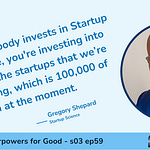Devin: What do you see as your superpower?
Ruth: When I was growing up, my father, who was also an entrepreneur, basically imparted this sense of self-determination, you can just state what you want to be—put what you want to be out in the world, and then you can become it.
This is huge. I mean, this is big. I’m talking $250 billion. Coca-Cola Company has sponsored the launch of a FINRA-regulated crowdfunding business. I’ll wait a moment while you let that sink in.
One of America’s most valuable brands, one of its most prominent companies, and one of its most popular product owners has decided to enter the crowdfunding fray by collaborating closely with the startup crowdfunding portal.
Led by crowdfunding leader Ruth Hedges, who has been working in the industry for over a decade, is leading the new enterprise called Rise Up Crowdfunding.
Ruth says, “I’ve been trying to get corporate America to wake up to the value of this.” Well, it looks like she’s done it. She describes the business as “a funding portal that’s focused on women and minorities and veterans—the LGBTQ community—who have been horrendously left out of every other form of capital, most egregiously venture capital.”
Coca-Cola has a bit of self-interest at work here. With ambitious goals for hiring diverse subcontractors, the behemoth company is struggling to find companies with women, Black, Hispanic or LGBTQ owners capable of handling its volume.
Ruth explains, “We’re trying to help those companies that have the skills and the infrastructure but need to scale all of that to meet the demand of the contract and help them raise up to $5 million on Rise Up Crowdfunding.”
Ruth and Coca-Cola are taking this to the next level:
We're doing something else, and that is something I wish the venture capital world had done 50 years ago. We are requiring the entrepreneurs who qualify to be on our funding portal to pledge for equal pay, pledge for sustainability policy, to care about the planet—to have a diverse board. All the things that we've been fighting for, we are now making that a requirement, so they will not be able to get on the funding portal if they're not committed to these things.
She adds, “If venture capital groups and angel groups had required living wage of all the companies they funded over the last four or five decades, Bernie Sanders would be out of business.”
Ruth got started with investment crowdfunding before there was such a thing. After reading a blog post by Sherwood Neiss in 2008, she found his phone number and called him to say, “I think you’re my brother from another mother.”
Recognizing they needed a literal act of Congress to allow for investment crowdfunding, they went to work to do just that. “We started calling everybody we knew, going to Washington DC and walking the halls. I brought Senator [Harry] Reid into the mix and convinced him of the validity of this.”
On April 15, 2012, President Barack Obama signed the JOBS Act into law, giving birth to the industry with what the Securities and Exchange Commission ultimately called Regulation Crowdfunding.
Not one to set small goals, Ruth has set her sights on achieving scale quickly. She’s designed an effort to get “a million people to sign a pledge that says, ‘I pledge to put $100 into some offering in 2023.’” With that promise, $100 million of capital will be available to companies using Rise Up Crowdfunding.
That sounds ambitious, if not impossible, until you consider the backing of Coca-Cola. With a veritable army of employees and connections to a huge cadre of vendors and commercial customers, reaching a million people begins to feel downright reasonable.
Ruth has a message for venture capitalists, too. “Look, if you’re going to keep rejecting all of these diverse entrepreneurs, these women entrepreneurs, send them our way.” She plans to deliver that message to the venture community until it sticks.
Ruth has built her success on the confidence she learned from her father. She believes she can do anything she puts her mind to do. That’s a superpower!
How to Develop Confidence As a Superpower
Her confidence comes from taking her father’s confidence in her to heart and building on it with unshakable determination.
“When I tell [people] something, I will follow through 1,000 percent,” she says. “Failure is not an option. I will walk through fire to make something happen.”
She shared a story from early in her career to illustrate:
There was a food truck, or they used to call them, roach coaches. This roach coach drove up to a private school in Bel Air, California, where a friend of mine's mother was a teacher. The bell would ring, and the kids would go out, and they'd order their food from the truck. And that was the entire food program.
Some rich kid got food poisoning. The next day, the phones are ringing off the hook. And lawsuits—they were threatening lawsuits. “If you don't get another substitution for this roach coach, we are taking our kid out of your school.”
So, my phone rang, and it was like, “Hey, do you want to start a catering business at this private school in Bel Air?”
I called my parents. I didn't have a pot to piss in. They gave me $1,000. I literally started catering business with $1,000, a cutting board, a few bowls and some other stuff. And 18 years later, I had made $15 Million. I never borrowed a dollar from anybody. I did it all.
I didn't use any line of credit. I literally launched a business. I ended up with 12 employees and two locations. I eventually expanded into a law firm in downtown Los Angeles called Latham and Watkins and did their food service for their executive dining room. I did thousands of weddings and bar mitzvahs and parties and all kinds of things over those years.
The key to developing this powerful self-confidence is “self-discipline,” Ruth says. “I think that that commitment to being disciplined in their journey of whatever it is they want to do is is is definitely going to be a requirement and something they would have to commit to.”
You can make self-confidence a superpower that enables you to do more good in the world by following Ruth’s example of self-discipline and commitment.
This book, The International Bank of Bob, is a decade old but as relevant as the day it was written. If you haven’t discovered this one, you’ll likely enjoy it. Note that Kiva, the subject of the book, was an early player in investment crowdfunding. Because the platform only promises the return of capital and not a return on it, it isn’t regulated like other investment crowdfunding portals.















